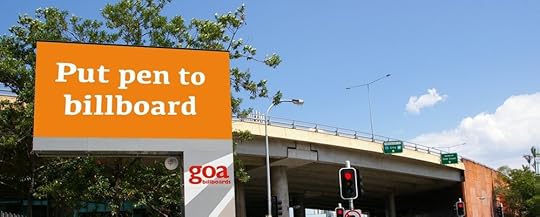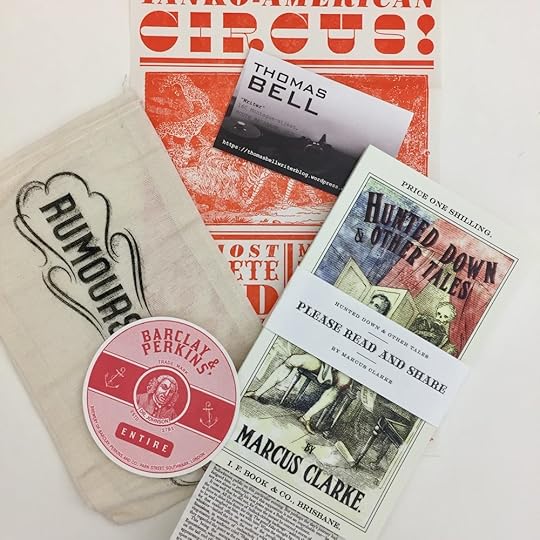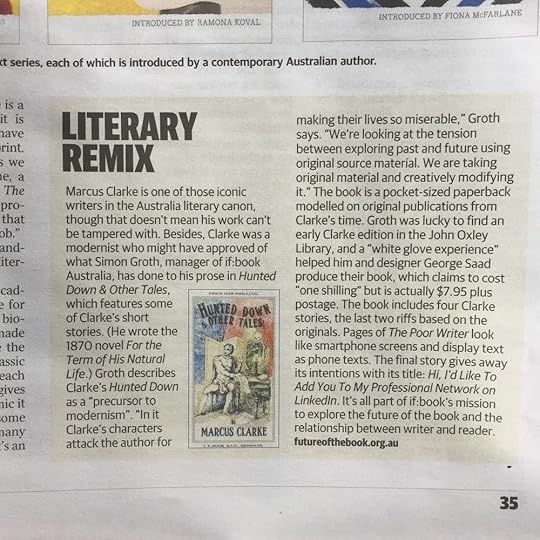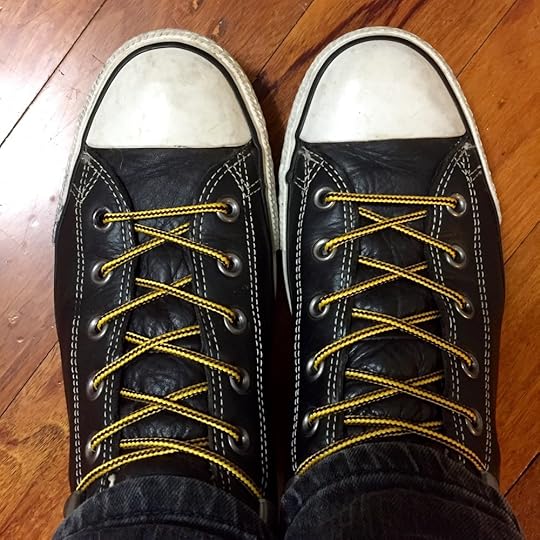Simon Groth's Blog
October 12, 2017
Eight Words on a Billboard

Ever wanted to see your name in lights? How about a 30ft high billboard?
#8WordStory is the latest community writing project that challenges you to write a great story using only eight of your finest words.
Write something great and your work could reach up to 300,000 people across Brisbane.
Billboard and signage company goa have given our team at Queensland Writers Centre access to their network of digital billboards as part of their annual Community Partnership Program.
More than a year in planning, the project kicks off with two weeks of 'teaser' campaign on Monday 16 October. Submissions are now open through the project web site, or using the hashtag #8WordStory on Twitter.
From 30 October, will turn the boards over to the best of the submissions we receive.
August 31, 2017
Writer's Life
My friends and colleagues at Queensland Writers Centre have featured me as part of the ongoing Queensland Writers Life series that asks some probing questions as to why we do what we do. It's already featured some tremendous and diverse talent from Sam Wagan Watson to Karen Foxlee to Krissy Kneen to Michael Gerard Bauer to... I could go on.
If you're at all interested in why writers do what they do, it's worth checking out the whole series.
Why do you write?
It’s tremendously satisfying to turn a vague idea into a finished, coherent piece of writing. Ideas tend to be fairly amorphous: you have a hazy vision of a character, a situation, a set of ideas. What writing does is discipline those ideas. Nothing exposes a stupid idea like reading it, externalised into text. But a good idea, rendered on the page or the screen, is an extraordinary reward for the sweat and hard graft that went into making it. It happens on two levels too: if can you derive satisfaction from a good sentence or turn of phrase you’re going to enjoy writing a lot more than if you’re dependent on completing an entire piece.
Ultimately, though, writing is about reaching a readership. As satisfying it as can be on its own, the text is just a vehicle to reach someone else. You place your trust in readers to understand you and to see the world the way you do, even if just for a little while. Sometimes you hear back from readers and it’s almost a little shocking to be reminded that the other party in this relationship is not just abstract. And that’s kind of where it all comes together. That’s why I write: to make a very human connection to someone else.
How did you come to writing?
At school, I was always ‘pretty good’ at writing and language from early on and even outside school I spent a lot of time creating stories and recording them in one way or another. I did have a good teacher who pushed me to read more challenging texts. That really set me on the path, I guess. I kept reading as much interesting stuff as I could and when I started to write, I had the right blend of naiveté and confidence to try new narrative voices and devices.
What were your greatest obstacles starting out? How did you overcome them?
I never thought of writing as a profession that was available to me because I never realised it was something I could just decide to do. I don’t know, I must have thought writers get anointed by the gods or something. For a long time, I was determined to be a musician, but I was a better writer and really I prefer working my own, quiet hours. The only difference between a writer and anyone else is that writers submit. They take the risk of putting their work out there. That seemed like a huge obstacle because when you start, you have big ideas that never quite make it the page the way you want them to. But you have to show somebody sooner or later and the courage that takes is not as profound as it first seems. Publishers don’t assess your work with you looking over their shoulder. So learned to send my work off when I thought it was good enough and put it out of my mind until I received a response. I got a lot of encouraging rejections. Those were like gold. It meant that I should keep trying, I was getting closer.
How do you keep yourself motivated and disciplined?
Mostly, I read. I read other people’s work and I read my own work. I don’t know what happens for other writers, but if I don’t work on a piece for a little while, it gets worse and worse in my memory, all the mistakes magnified. When I read it over, those mistakes return to normal size and the job of fixing a work in progress gets a little easier. That motivates me. It’s only a little more work and it could get so much better.
How do you manage your writing time with everything else you do? How has that changed from when you were starting out?
I don’t have a regular schedule. I don’t write every day. I steal bits of time like a thief in the night to work on a piece. Sometimes I block off a chunk of time to knock something over and that works pretty well. I’ve moved through different routines over the years depending on what else is going on. I’m making this up as I go along.
I used to write like a maniac. I would start writing at 9:00 or 10:00pm and work through to 3:00 or 4:00, sleep for a couple of hours, go and do a full day’s work, then do at all over again. For a while I was doing this three of four days a week. I’m lucky I didn’t lose my freaking mind. Or maybe I did. I don’t know. That was stupid. I have kids now. And an ageing body. And maybe I’m a little less stupid. Maybe.
Where do you write? How do you arrange your working space?
I don’t have a regular time and don’t have a regular space. I move between spaces and computers. I have a study that I can use to shut the world out when I need to. Other times, I’ll set up a laptop wherever’s nice. I like couches. My back deck is nice.
What are your essential writing tools?
I’ve used a parade of Macs over the years: desktops and laptops. For software, it’s always been the sad and stodgy old Microsoft Word. I have a strange relationship with Word. I know every quirk in its system and how to set it up just so. But I’ve never loved using it. I’m just used to it. I’ve tried as many other word processors as I can get my hands on, but none have stuck. More recently I’ve used Scrivener but only for planning and arranging. I once tried using a manual typewriter for a month and it was surprisingly comfortable and familiar as a writing tool. I get why 20th century writers loved theirs so much. But it’s a ridiculous tool for 2016, little more than a novelty and a complete pain at the point you need to submit your work.
What’s the one thing you wish you’d known when you were starting out as a writer?
The road is longer and harder than you ever imagine it will be, but it’s full of surprises and it rarely leads to the destination you’re expecting.
What do you read and how do you read as a writer?
I tend to read fiction in print and I read it painfully slowly. It’s almost like I’m absorbing the text through osmosis. I can speed up when I need to (and I often need to) but that’s my default setting. By contrast, I read a truckload of non-fiction on screen: my phone is my main screen-based reading device though I read a lot on laptop/desktop too. I read a lot of experimental stuff on screens too: again preferring my phone, but a computer if necessary.
How do you overcome ‘writer’s block’?
Pretty sure I don’t get that Hollywood-style ‘writers block’. I’ve never been like Billy Crystal stuck on ‘The night was…’. I have days where it works and days where it doesn’t. If I’m struggling with a bit of text, sometimes I move on the next bit and leave the crappy part for later. Sometimes I have a deadline looming and I just need to sweat the words out. Maybe it shows when I do that, but deadlines are deadlines and meeting a word count with something you’re not completely satisfied with is a whole lot better than not delivering. I’ve been on the receiving end of that and, trust me, nothing pisses an editor off more.
What one piece of advice would you give to aspiring writers?
Just one? Ha!
Read as much as you can and when you’re getting the words down, be true to yourself. Don’t try too hard. Enjoy the work: enjoy the language. Savour small victories. Don’t brag about your word count.
https://qldwriters.org.au/2017/08/23/qld-writers-life-simon-groth
March 1, 2017
Copying as part of creative practice
The Australian Digital Alliance recently invited me to take part in a discussion on the experience of using of copyrighted material as part of creative practice for their annual forum held at the beautiful National Library of Australia. With me was filmmaker Andrew Garton and Nicolas Suzor and Kylie Pappalardo, both from the Queensland University of Technology.
February 5, 2017
The Role of Producer
Recently published over at WQ, a piece I wrote on the unique role of the producer in creating a reading experience for the screen.
Use the possibilities of the platform, imagine how the features of the device can bring something unique to the story. And at the same time never lose sight of the reading experience. The producer’s job, like the editor’s, has much to do with balance and restraint.
Read more at Writing Queensland.
November 21, 2016
Zimmerman's Nobel
When I first learned that the Nobel Committee had selected Bob Dylan for the Literature Prize, my immediate reactions were contradictory. I was struck by what an odd choice it was and at the same time realised that it made a lot of sense too.
Then I tweeted the following statement:
In other news, George Harrison got Physics, Roy Orbison got Peace, Tom Petty got Chemistry, and Jeff Lynne got Economics.
I challenge you to find a better fit for each Wilbury.
The following morning, I spoke to Steve Austin on ABC radio Brisbane with a slightly more considered response. In the month and a bit that has since passed—a long period of non-communicado from Dylan to the Nobels before a somewhat grudging acceptance and a probable no-show at the ceremony—my initial reactions haven't changed much.
First of all, it's pretty clear rock and roll can kiss goodbye any vestige of rebelliousness it may have still been clinging to. Sorry, that goes for you punks as well.
Dylan's contribution to culture is unassailable. If you don't listen to his records, you'll know at least a few of his songs and you'll definitely know plenty of music, films, books, and other arts that he has directly influenced. This is not just popularity. Dylan fused a number of song traditions together into a mashup of American culture which proliferated across art forms throughout Western culture and beyond. Almost singlehandedly, he changed the course of two genres in one album (I'll let you decide which one).
Does that make him eligible for a literary prize, though?
I would argue his approach to songwriting has a literary bent to it. There are a great many songs I love that have great musicianship, but whose lyrics fall short. Some lyrics are just clunky. Others are downright appalling. A small number of songs I love have fine lyrics, but don't really have a whole lot to say. Rare are the songs that match great music with well-thought-out ideas, beautifully expressed: lyrics that can comfortably stand alone.
Dylan has done this. Not all the time (far from it, see 1969-1973), but consistently enough in a formidable body of work that spans decades. This is what is being celebrated here.
I've seen a few article links that apparently bemoan the decision of the Nobel Committee. At least that's what the headlines suggest. I haven't read much past the headlines because, frankly, I don't give a shit what some columnist at The Guardian or some novelist moonlighting for The New Yorker thinks. I don't really care what Rolling Stone thinks either.
If you think it shouldn't have gone to a musician because it's literature and that means books, well, fuck you. What are you doing here reading this, anyway?
If you think it shouldn't have gone to Dylan because he's rich and famous and doesn't need any more accolades, you kind of have a point.
What all this aimless discussion and showy angst and instant opinionating comes down to is a pretty simple question: what are literary prizes for? For me, that question especially as it applies to this kind of 'lifetime achievement' award has two possible responses. Both are equally valid.
If the purpose of a literary prize is a form of 'activism' to shine a light on a writer whose work has been otherwise unfairly overlooked—if the intention is to correct a perceived wrong—then the choice of Dylan is almost insulting.
It is hard to imagine another living artist for whom a Nobel Laureate would have less impact—whether financially or critically—than Robert Zimmerman. This is a guy who couldn't be arsed rehearsing for a gig at the White House and out-cooled President Obama with little more than a nod by way of interaction. When the Nobel Committee couldn't get ahold of Dylan to see if he would even accept the award, it was so completely in character that I was amazed they hadn't anticipated it.
But a literary prize can have another purpose. It can broaden the perception of the art form it celebrates. It can redraw boundaries around what can be thought of as literature and inspire a reexamination of what it means and how it can be communicated and disseminated. Literature is not defined by its container.
In the meantime, I'm going to continue listening to Blood on the Tracks, knowing the inscrutable riddle at the heart of 'Tangled Up in Blue' can never be resolved. That's the point. And it's as good as anything I've read in a book.
October 6, 2016
Kudos cocktails
Hey, Hunted Down and Other Tales, my odd little book of remixed Marcus Clarke short stories is a finalist in the Australian Graphic Design Association's annual awards for 2016.

To make this book possible, I was joined by editor Aimée Lindorff and designer George Saad. And it's George who really deserves the lion's share of the credit here. His attention to detail, mimicking nineteenth century books, circus, posters, beer labels, and newspaper clippings is impressive enough without also upending standard book design conventions into a reading experience that goes well beyond the ordinary.
My celebratory cocktail of choice was a variation on the Old Fashioned:
2 oz rye whisky1/4 oz simple sugar syrupa dash of Angostura bittersStir in a mixing glass with ice. Strain into a rocks glass with a large ice cube. Garnish with lime peel.
Cheers!
August 26, 2016
Literary Remix
Kind words from Phil Brown in today's Courier-Mail for Hunted Down and Other Tales , even daring to suggest Clarke himself may have approved of my 'creative modifications'.

The book is available hereabouts.
August 24, 2016
July 2, 2016
Being Fictionalised
In his maybe questionable wisdom, Matt Finch has chosen to turn an interview with me about life, the universe, and remixing 19th century literature into a miniature epic featuring actual details about the origins of my name, silver spoons and the climate of the current (and at this point still unresolved) Australian election.
Matt is the Creative in Residence at the State Library of Queensland (even though "creative" is not a noun) and a project worker at British Library Labs.
Read his story, For the Term of His Natural Life here.
“Groth. I don’t think I’ve ever heard that surname before.”
“It’s Prussian.”
“Right. Cool.”
“Matthew Finch is a bit generic Anglo.”
“Yeah, there are a few of us scattered around. Sometimes we get each other’s email when someone makes a typo. And I’m always being mistaken for someone else. I’ve got one of those faces as well as one of those names.”
“You ever Google yourself? My brother and I have a podcast. We were looking for names and found a Groth Brothers Chevrolet dealership in California. It thrived for three generations, then the last ones ran it into the ground. But my brother and I stole their name for our podcast: it's called The Fireproof Garage."
I laugh.
"There was a Simon Groth in nineteenth century Copenhagen. I found him online too. He was an assayer of silver. But you mostly find his mark on cutlery, nothing else. I bought one of his spoons. Anyway…”
I’m just making small talk; Simon Groth really wants to show me this thing he’s invented. He works at Australia’s Institute for the Future of the Book. They resurrect classic Aussie authors on social media. They make hard copies of shared documents with tracked changes. But Simon tells me his new project is in another league entirely.
Back in the Garage
Darren and I are back in the Fireproof Garage for a new series of our podcast, a cavalcade of whimsy from two sibling writers taking about whatever junk pops into their heads at any given moment. We're assured it's better than it sounds.




